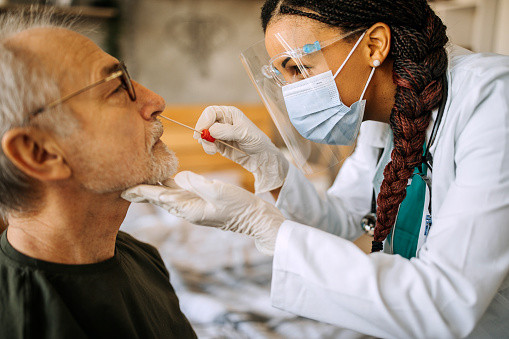First Case Of The Highly Contagious XBB.1.5 Covid Variant Detected In South Africa

The first case of the XBB.1.5 covid variant has been detected in South Africa.
The variant was discovered in gene sequencing carried out by researchers at Stellenbosch University from a sample taken on Dec. 27, announced, Tulio de Oliveira, Director of the Centre for Epidemic Response and Innovation.
First XBB.1.5 detected in SA today by Stellenbosch University, Network for Genomics Surveillance in South Africa (NGS-SA). XBB.1.5 = 1% (1/97 of recent genomes). Isolate from 27-Dec-2022. Interesting, two others assigned as BA.2.75 with extra Spike F486P mutation. Tweet 1/2
— Tulio de Oliveira (@Tuliodna) January 6, 2023
"At present, no increase in cases, hospitalization, or deaths. NGS-SA (Network for Genomics Surveillance in South Africa (NGS-SA), is increasing genomics surveillance in South Africa," said Oliveira, as reported by IOL.
"Our labs also support dozens of other African countries as part of the Africa CDC PGI program."
The XBB.1.5 strain of coronavirus has rapidly spread across the globe and is now the dominant strain in the United States. The highly contagious sub-variant has been detected in at least 28 other countries and continues to spread.
So far, there have been no significant differences in severity caused by the XBB.1.5 strain of the virus. However, it has been colloquially called the "Kraken variant" by some for its capacity to spread quickly.
The World Health Organisation's COVID-19 technical lead, Maria van Kerkhove, this week called XBB.1.5 "the most transmissible sub-variant" descendant yet of the omicron variant.
"The reason for this is the mutations that are within... this sub-variant of Omicron, allowing this virus to adhere to the cell and replicate easily," she added, as per Global News.
As of yet, the symptoms associated with the 'Kraken' variant are said to be similar to the previous Omicron strains, but further research and stronger evidence are needed to confirm this information, according to WHO.
The XBB.1.5 subvariant is just as good at avoiding antibodies from vaccines and infection as its relatives, XBB and XBB.1. However, XBB.1.5 has a mutation that makes it bind more tightly to cells, giving it an advantage in terms of growth, according to scientists.
The WHO's recent announcement is worrying as it suggests that the virus is becoming more resistant. However, there are steps that people can take to protect themselves from becoming infected, such as washing their hands regularly for at least 20 seconds, wearing a face mask when around others, and maintaining a social distance of at least six feet.
© Copyright 2025 IBTimes ZA. All rights reserved.

















